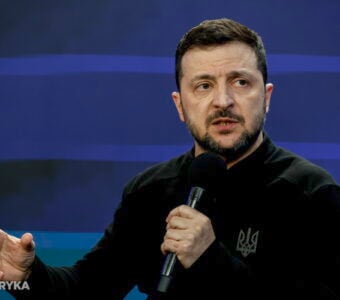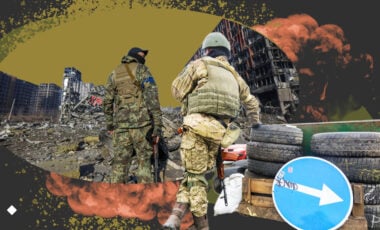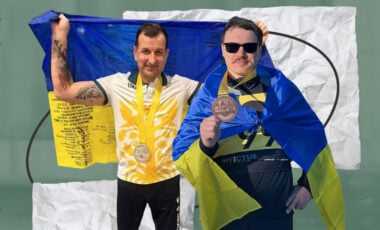Bloomberg finds ceasefire in Ukraine might bring more harm than good

Photo: Reuters
Given the current circumstances, establishing a truce with Russia would not only diminish Ukraine's strength but also give Putin a sense of confidence, potentially escalating future military aggression. Therefore, the West needs a better plan.
The Bloomberg agency reported that.
The question of whether Ukraine will achieve victory is still up in the air. President Volodymyr Zelensky did not reveal the specifics of the Victory Plan. Still, he emphasized that only a resilient Ukraine will be able to compel Putin to come to the negotiating table.
Meanwhile, Putin remains convinced that his tactic of wearing down the West's backing for Ukraine can prevail, fueling a prolonged war.
"He's right to an extent. So long as Putin believes he can outlast Western support for Ukraine, his war of attrition will continue. The question is how to change his calculation," the article emphasizes.
The material's authors stress that anyone in their right mind desires to end the fighting. A staggering one million individuals have already lost their lives or been wounded. The war has resulted in a large-scale displacement and significant ruin of homes and vital infrastructure. It has also caused new geopolitical unrest and devastated an economy that is the world's supplier of necessities.
"The impulse to throw in the towel — to accept Putin's terms, stop the carnage, and prevent further escalation — is understandable. But is such an agreement even possible?" the agency editors asked.
According to Bloomberg, Putin has sometimes pretended to be interested in negotiations. Still, his demands for recognition require Ukraine to give up its claims to four illegally annexed regions, Crimea, and any hopes for joining NATO, which shows his lack of genuine intent.
On the contrary, Russia's entire economy has been reoriented to support the war; it still buys weapons and technology from rogue countries, and Putin's stated goal remains unchanged: Ukraine must be reduced to the level of a vassal of Russia.
Why the ceasefire is dangerous for Ukraine
The ceasefire poses significant risks for Ukraine as it will allow Russia to regain strength and replenish its military resources. The pause will provide the Russian military with a window of time to:
- recruit for the 30,000 soldiers they lose every month,
- plan new mobilization efforts,
- eliminate operational defects,
- replenish the stockpile of weapons.
The material's authors emphasized that Putin has consistently utilized such breaks, such as the one after the annexation of Crimea in 2014, to strategize for new offensives. Any effort to negotiate a truce without ensuring complete protection for Ukraine would merely serve as a temporary withdrawal for Russia, providing it with the opportunity to fortify its position and initiate fresh attacks.
Another concern is the potential decline in support for Ukraine from its Western allies, as they are currently seeking ways to redirect their financial resources toward domestic priorities. For example, Germany is considering a significant decrease in financial assistance to Ukraine in its budget for the upcoming year. The halt of hostilities could potentially serve as a justification for these countries to decrease their support.
According to the article, Putin has been counting on the West losing interest in supporting Ukraine, hoping Russian citizens will remain complacent, and relying on ample funding for his army to prolong the conflict. A deceitful ceasefire could further solidify these factors and ultimately put both Ukraine and the West in a disadvantageous position when fighting recommences.
How the West can influence the course of the war
"The goal for the US and its allies, then, should be to ensure that Ukraine has maximal negotiating leverage before entering into talks," the authors believe.
To achieve this goal, it is crucial to continue providing weapons, specifically air defense systems, and long-range missiles, and lift any limitations on their usage. These actions are the only means to alter Putin's calculations and impact his strategic decisions.
The article says that the West must recognize that any significant reduction in funding now will not end the war—it will embolden Putin.
Next, the allies must agree on a reliable security guarantee for Ukraine. This task is not easy, and NATO is understandably reluctant to extend its open defense to a non-member state. Nuance and ambiguity may be necessary.
But a collective commitment – explicit or otherwise – to defend the territories currently under Ukrainian control must be on the table to deter further aggression, Bloomberg notes.
"Throughout his bloody reign, Putin has always been willing to break truces, violate agreements, and go back on his word whenever he perceives a strategic benefit to doing so. There's every reason to think he'd do the same this time. Without proper precautions, a cease-fire wouldn't end the war, save lives or benefit everyday Ukrainians. It would do the opposite," the authors of the article summarize.
For reference:
It should be noted that Ukraine's goal is to defeat the Russian Federation and achieve lasting peace, not just a temporary ceasefire. Five factors support this stance.
On June 14 this year, Putin announced that he has new proposals for a "peaceful settlement" of the war against Ukraine, including the following:
- Ukrainian troops have to go from the entire territory of four Ukrainian regions,
- international recognition of Donetsk, Luhansk, Zaporizhzhia, Kherson regions, and Crimea as Russian territories.
- Kyiv must declare that it has no plans to join NATO.
Zelensky responded to Putin's offer for a purported peaceful resolution to the war by calling it an ultimatum that can't be trusted. The president also likened Putin's actions to those of Nazi leader Hitler.

Zelensky's administration to reveal victory plan for Ukrainians except for "secret provisions," implementation on enemy territory to follow

Zelensky unveils victory plan to Biden: US President highlights key elements for Ukraine's success



















































